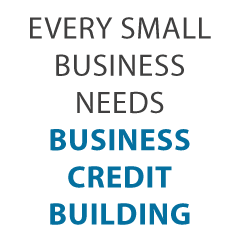- Connect With Us!
- (877) 600-2487
- info@creditsuite.com
Begin Building Corporate Credit Fast with Our Foolproof Methods
Published By Janet Gershen-Siegel at January 22nd, 2018
Start Building Corporate Credit Fast
Building corporate credit fast means that your small business gets chances you never assumed you would. Developing corporate credit opens doors.
Every Company Needs Corporate Credit Building
Corporate credit is credit in a small business’s name. It doesn’t tie to an entrepreneur’s individual credit, not even if the owner is a sole proprietor and the solitary employee of the small business.
Therefore, an entrepreneur’s business and personal credit scores can be very different.
Building Corporate Credit Fast: The Benefits
Since corporate credit is independent from personal, it helps to secure an entrepreneur’s personal assets, in the event of legal action or business bankruptcy.
Also, with two separate credit scores, an entrepreneur can get two separate cards from the same vendor. This effectively doubles purchasing power.
Another advantage is that even startup ventures can do this. Heading to a bank for a business loan can be a formula for disappointment. But building corporate credit, when done properly, is a plan for success.
Individual credit scores depend upon payments but also additional components like credit utilization percentages.
But for corporate credit, the scores really only hinge on if a company pays its invoices timely.
Building Corporate Credit Fast: The Process
Building corporate credit is a process, and it does not occur automatically. A business will need to proactively work to develop corporate credit.
That being said, it can be done easily and quickly, and it is much faster than developing individual credit scores.
Merchants are a big aspect of this process.
Undertaking the steps out of sequence will cause repetitive rejections. Nobody can start at the top with company credit. For example, you can’t start with retail or cash credit from your bank. If you do, you’ll get a denial 100% of the time.
Company Fundability
A business must be fundable to credit issuers and merchants.
As a result, a company will need a professional-looking web site and email address. And it needs to have site hosting from a supplier such as GoDaddy.
Plus, company phone and fax numbers ought to have a listing on ListYourself.net.
In addition, the business telephone number should be toll-free (800 exchange or comparable).
A small business will also need a bank account devoted strictly to it, and it has to have all of the licenses essential for running.
Licenses
These licenses all have to be in the exact, accurate name of the small business. And they must have the same company address and telephone numbers.
So bear in mind, that this means not just state licenses, but possibly also city licenses.
Find out why so many companies are using our proven methods to improve their business credit scores.
Working with the Internal Revenue Service
Visit the Internal Revenue Service website and obtain an EIN for the business. They’re free of charge. Pick a business entity such as corporation, LLC, etc.
A business can start off as a sole proprietor. But they will probably wish to switch to a type of corporation or an LLC.
This is in order to diminish risk. And it will optimize tax benefits.
A business entity will matter when it comes to tax obligations and liability in the event of litigation. A sole proprietorship means the entrepreneur is it when it comes to liability and taxes. Nobody else is responsible.
Sole Proprietors Take Note
If you run a small business as a sole proprietor, then at least be sure to file for a DBA. This is ‘doing business as’ status.
If you do not, then your personal name is the same as the small business name. Because of this, you can find yourself being personally responsible for all company debts.
Also, per the Internal Revenue Service, by having this arrangement there is a 1 in 7 possibility of an IRS audit. There is a 1 in 50 possibility for corporations! Steer clear of confusion and drastically lower the odds of an Internal Revenue Service audit at the same time.
Starting Off the Corporate Credit Reporting Process
Start at the D&B website and obtain a cost-free D-U-N-S number. A D-U-N-S number is how D&B gets a company in their system, to generate a PAYDEX score. If there is no D-U-N-S number, then there is no record and no PAYDEX score.
Once in D&B’s system, search Equifax and Experian’s sites for the small business. You can do this at fastcs.wpengine.com/reports. If there is a record with them, check it for correctness and completeness. If there are no records with them, go to the next step in the process.
In this way, Experian and Equifax will have something to report on.
Vendor Credit Tier
First you need to build trade lines that report. This is also known as the vendor credit tier. Then you’ll have an established credit profile, and you’ll get a corporate credit score.
And with an established corporate credit profile and score you can begin to obtain credit in the retail and cash credit tiers.
These varieties of accounts often tend to be for the things bought all the time, like marketing materials, shipping boxes, outdoor work wear, ink and toner, and office furniture.
But first off, what is trade credit? These trade lines are credit issuers who will give you preliminary credit when you have none now. Terms are frequently Net 30, instead of revolving.
So, if you get approval for $1,000 in vendor credit and use all of it, you must pay that money back in a set term, such as within 30 days on a Net 30 account.
Find out why so many companies are using our proven methods to improve their business credit scores.
Details
Net 30 accounts need to be paid in full within 30 days. 60 accounts must be paid in full within 60 days. In comparison with revolving accounts, you have a set time when you have to pay back what you borrowed or the credit you made use of.
To kick off your corporate credit profile properly, you need to get approval for vendor accounts that report to the corporate credit reporting agencies. As soon as that’s done, you can then use the credit.
Then repay what you used, and the account is on report to Dun & Bradstreet, Experian, or Equifax.
Vendor Credit Tier – It Makes Sense
Not every vendor can help in the same way true starter credit can. These are merchants that will grant an approval with a minimum of effort. You also need them to be reporting to one or more of the big three CRAs: Dun & Bradstreet, Equifax, and Experian.
You want 5 to 8 of these to move onto the next step, which is the retail credit tier. But you may have to apply more than one time to these vendors. So, this is to demonstrate you are responsible and will pay in a timely manner.
Accounts That Don’t Report
Non-Reporting Trade Accounts can also be helpful. While you do want trade accounts to report to at the very least one of the CRAs, a trade account which does not report can yet be of some worth.
You can always ask non-reporting accounts for trade references. And credit accounts of any sort ought to help you to better even out business expenditures, thus making budgeting simpler. These are providers like PayPal Credit, T-Mobile, and Best Buy.
Retail Credit Tier
Once there are 5 to 8 or more vendor trade accounts reporting to at least one of the CRAs, then progress to the retail credit tier. These are businesses such as Office Depot and Staples.
Just use your Social Security Number and date of birth on these applications for verification purposes. For credit checks and guarantees, use the small business’s EIN on these credit applications.
One such example is Lowe’s. They report to D&B, Equifax and Business Experian. They want to see a D-U-N-S and a PAYDEX score of 78 or better.
Fleet Credit Tier
Are there 8 to 10 accounts reporting? Then move onto the fleet credit tier. These are businesses such as BP and Conoco. Use this credit to buy fuel, and to repair, and take care of vehicles. Just use your Social Security Number and date of birth on these applications for verification purposes. For credit checks and guarantees, make sure to apply using the company’s EIN.
One such example is Shell. They report to D&B and Business Experian. They want to see a PAYDEX Score of 78 or better and a 411 business phone listing.
Shell might claim they want a specific amount of time in business or revenue. But if you already have enough vendor accounts, that won’t be necessary. And you can still get approval.
Find out why so many companies are using our proven methods to improve their business credit scores.
Cash Credit Tier
Have you been sensibly handling the credit you’ve gotten up to this point? Then move to the cash credit tier. These are service providers such as Visa and MasterCard. Only use your SSN and date of birth on these applications for verification purposes. For credit checks and guarantees, use your EIN instead.
One example is the Fuelman MasterCard. They report to D&B and Equifax Business. They need to see a PAYDEX Score of 78 or higher. And they also want you to have 10 trade lines reporting on your D&B report.
Plus, they want to see a $10,000 high credit limit reporting on your D&B report (other account reporting).
Also, they want you to have an established business.
These are companies such as Walmart and Dell, and also Home Depot, BP, and Racetrac. These are usually MasterCard credit cards. If you have 14 trade accounts reporting, then these are doable.
Building Corporate Credit Fast: Monitor Your Corporate Credit
Know what is happening with your credit. Make certain it is being reported and fix any inaccuracies ASAP. Get in the habit of taking a look at credit reports and digging into the specifics, and not just the scores.
We can help you monitor corporate credit at Experian and D&B for 90% less than it would cost you at the CRAs. See: fastcs.wpengine.com/monitoring.
Update Your Information
Update the information if there are errors or the information is incomplete.
Building Corporate Credit Fast: Fix Your Corporate Credit
So, what’s all this monitoring for? It’s to challenge any problems in your records. Errors in your credit report(s) can be fixed. But the CRAs often want you to dispute in a particular way.
Disputes
Disputing credit report inaccuracies usually means you send a paper letter with duplicates of any proof of payment with it. These are documents like receipts and cancelled checks. Never send the originals. Always mail copies and retain the original copies.
Fixing credit report mistakes also means you precisely detail any charges you dispute. Make your dispute letter as crystal clear as possible. Be specific about the issues with your report. Use certified mail so that you will have proof that you mailed in your dispute.
Building Corporate Credit Fast: A Word about Corporate Credit Building
Always use credit sensibly! Don’t borrow beyond what you can pay off. Track balances and deadlines for repayments. Paying promptly and completely will do more to boost corporate credit scores than almost anything else.
Establishing corporate credit pays. Great corporate credit scores help a company get loans. Your loan provider knows the small business can pay its debts. They recognize the small business is authentic.
The small business’s EIN links to high scores and lending institutions won’t feel the need to call for a personal guarantee.
Building Corporate Credit Fast: Takeaway
Corporate credit is an asset which can help your small business for many years to come. Learn more here and get started toward building corporate credit fast.

 " class="attachment-blog-single size-blog-single wp-post-image" alt="Get Business Credit Cards for New Businesses Credit Suite-Business Line of Credit Decoded" title="Get Business Credit Cards for New Businesses">>
" class="attachment-blog-single size-blog-single wp-post-image" alt="Get Business Credit Cards for New Businesses Credit Suite-Business Line of Credit Decoded" title="Get Business Credit Cards for New Businesses">>

1 Comment
Very knowledgeable information . Thank You Mike